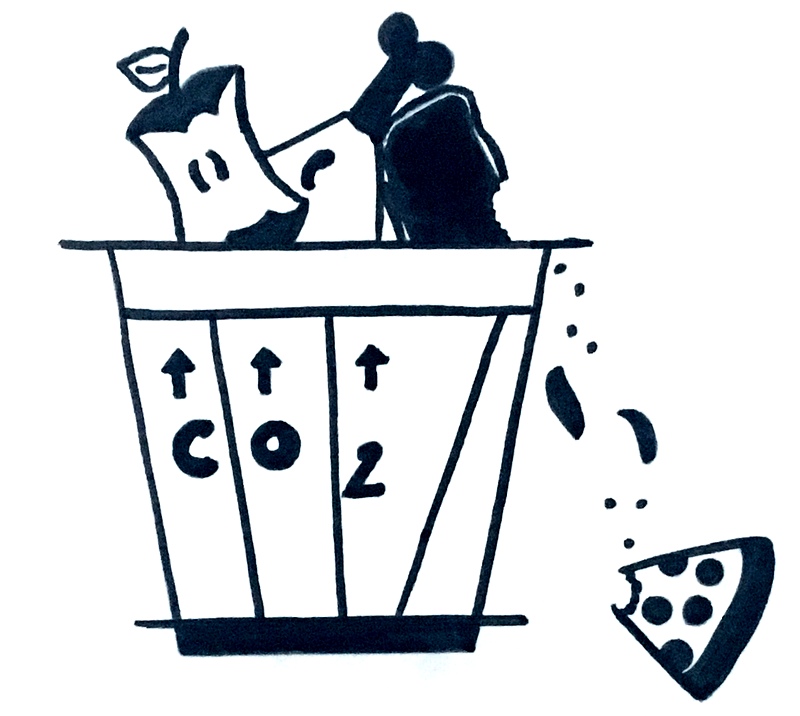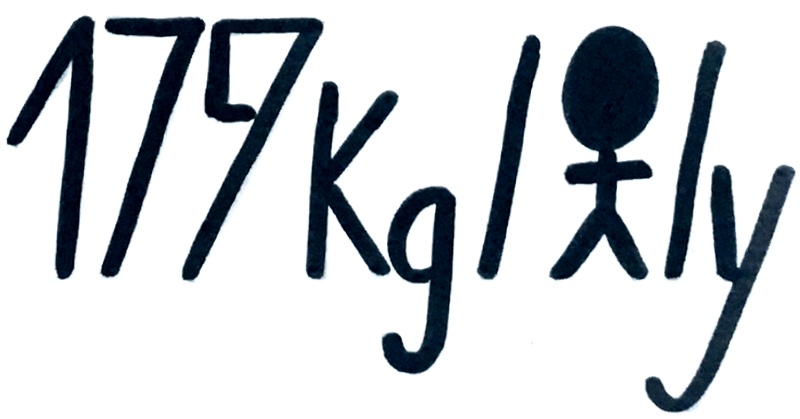How psychology can help solve the food waste crisis

Food waste: It’s not just rubbish
Food insecurity is a major issue in most developing countries. About 821 million people in the world suffer from chronic undernourishment, the vast majority living in developing countries (FAO, 2018). And hunger is on the rise.

At the same time, a 2018 published study revealed that ⅓ of worldwide food i.e. 1.3 billion tons per year are being wasted (Michelini et. al, 2018).



In the EU on average 179 Kg of food is wasted per capita per year. This equals 89 million tons of waste per year.

Food waste is costly. For society and for your wallet. On average every Austrian household wastes about 300 to 400 € per year on food that is later thrown away.
Just imagine for a second how you could have spent that money (wisely) instead.
This mismatch and imbalance between overproduction and waste on one hand and lack of food on the other is neither economically defendable nor ethical.
It actually causes a dunghill of severe problems: hunger, health hazards, inequality and climate change – to name only a few.
The ecological impact of food waste on the planet should not be underestimated: In Austria for instance, the production of food is responsible for more than ⅕ of CO2 emissions.

The source of all evil
Food waste is mainly a result of:
– Consumer behaviour (bad purchase planning, expiring “best-before-dates”) and attitudes (carelessness towards food waste)
– Bad co-ordination between different intermediaries in the food supply chain
– Pre-set quality standards: food items that do not fully conform to standards are discarded/lost in the food production and trading process.
The solution to all evil: Set a goal … and then?
Goal n°2 of the United Nations Sustainable Development Goals (SDGs) aims to end hunger by 2030 and to “ensure access by all people in the world to safe, nutritious and sufficient food all year round” (UN, 2019).
The Austrian Federal Waste Management Plan (Bundes-Abfallswirtschaftsplan 2017) has also set an unambiguous (and ambitious?) goal: by the year 2030 food waste ought to be reduced by 50%.
In order to achieve this goal, the plan suggests:
– Awareness and informational campaigns for private households.
– Education measures targeted at children. Food waste as part of the teaching instruction plan in schools.
These measures are a point of start, but nowhere near sufficient if we take food waste reduction seriously. In fact, public policy instruments that build (solely) on providing information to citizens are all too often ineffective and a waste of money.
The 17 SDGs have for instance been criticised for overloading people with complex information. Perhaps as a result, just over 1 in 10 Europeans actually know what the SDGs are (according to the latest Eurobarometer (2017)).

Here is why.
Homo oeconomicus vs Homo sapiens
To begin with, policy makers’ assumptions on consumer behaviour and attitudes are mistaken. They assume that we are ‘homo oeconomicus’, have perfect information processing capacity, behave rationally and weigh all possible alternatives to make optimal choices.
Yet, the reality is a different story. We are ‘homo sapiens’: Our judgements systematically deviate from rationality because we are constrained by limited time, limited information and limited mental ability.
This is what Nobel prize winner Herbert Simon famously called bounded rationality. As a result we often rely on mental short-cuts and automatic simplification tools (heuristics) and biases when we make choices and decisions.
Oftentimes our behaviour is not even consistent with the attitudes we advocate, i.e. we can be in general “pro environment” and “pro carbon tax” at the same time as we throw away edible food in the privacy of our homes. This inconsistency is what is called a cognitive dissonance.
The case for psychology
The point that I want to raise here is that a different and new approach is needed if we really want to end the food waste crisis.
Understanding the human’s psychology is key for providing the right incentives and solutions. The homo oeconomicus – although many classical economists’ “best buddy” – is neither realistic nor reality.
Coming up next in this section:
I delve deeper into problems behind food waste from a psychological lens and present concrete ideas and solutions.
Ready for change?
Stay tuned 🐝
Written and published June 2019
by Jessica
List of references I used in this article:
Bazerman & Moore (2009). Judgement in managerial decision making, John Wiley & Sons, 7th edition.
BMLFUW Bundesministerium für Land- und Forstwirtschaft, Umwelt und Wasserwirtschaft (2017). Bundes-Abfallwirtschaftsplan 2017. Volume 1
FAO, IFAD, UNICEF, WFP and WHO (2018). The State of Food Security and Nutrition in the World 2018. Building climate resilience for food security and nutrition. Rome, FAO.
FAO (Food and Agriculture Organization of the United Nations) (2011) Global food losses and food waste – Extent, causes and prevention. Rome, FAO.
FAO (Food and Agriculture Organization of the United Nations) (2015), International Fund for Agricultural Development, World Food Program (2015) “The State of Food Insecurity in the World 2015. Strengthening the enabling environment for food security and nutrition.” Rome, FAO.
Kahneman, D. (2011). Thinking, fast and slow.
Lehner, Mont, & Heiskanen. (2016). Nudging – A promising tool for sustainable consumption behaviour? Journal of Cleaner Production, 134, 166-177.
Michelini, Principato, & Iasevoli. (2018). Understanding Food Sharing Models to Tackle Sustainability Challenges. Ecological Economics, 145, 205-217.
Moschitz E. (2012) „Am Schauplatz-Reportage“ „Nicht gut genug“. ORF
Simon, H. (1967). Models of man: Social and rational: Mathematical essays on rational human behavior in a social setting. New York; London: John Wiley.
Special Eurobarometer 445 (2017) 27,929 individuals surveyed across 28 EU Member States. (Fieldwork: 11-12/2016)
Tversky, A., & Kahneman, D. (1974). Judgement under uncertainty: Heuristics and biases. Science, 185, 1124-1131.
United Nations (2019) retrieved from www.un.org/sustainabledevelopment/hunger/
Wien.gv.at (2019) retrieved from https://www.wien.gv.at/umweltschutz/abfall/lebensmittel/fakten.html